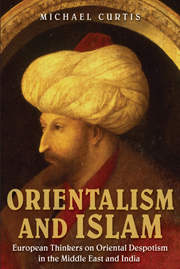Book contents
- Frontmatter
- Contents
- Acknowledgments
- Introduction: What's Past Is Prologue
- 1 European Views of Islam and Their Correlation with Oriental Despotism
- 2 Observant Travelers
- 3 Political Thinkers and the Orient
- 4 The Oriental Despotic Universe of Montesquieu
- 5 Edmund Burke and Despotism in India
- 6 Alexis de Tocqueville and Colonization
- 7 James Mill and John Stuart Mill: Despotism in India
- 8 Karl Marx: The Asiatic Mode of Production and Oriental Despotism
- 9 Max Weber: Patrimonialism as a Political Type
- 10 Conclusion
- Notes
- Select Bibliography
- Index
5 - Edmund Burke and Despotism in India
Published online by Cambridge University Press: 05 June 2012
- Frontmatter
- Contents
- Acknowledgments
- Introduction: What's Past Is Prologue
- 1 European Views of Islam and Their Correlation with Oriental Despotism
- 2 Observant Travelers
- 3 Political Thinkers and the Orient
- 4 The Oriental Despotic Universe of Montesquieu
- 5 Edmund Burke and Despotism in India
- 6 Alexis de Tocqueville and Colonization
- 7 James Mill and John Stuart Mill: Despotism in India
- 8 Karl Marx: The Asiatic Mode of Production and Oriental Despotism
- 9 Max Weber: Patrimonialism as a Political Type
- 10 Conclusion
- Notes
- Select Bibliography
- Index
Summary
Unlike Montesquieu, whom he regarded as “the greatest genius who has enlightened this age” and “a genius not born in every country or every time, a man gifted by Nature with a judgement prepared with the most extensive erudition, with a Herculean robustness of mind … a man who could spend twenty years in one pursuit,” Edmund Burke was an active politician, a formidable parliamentarian in the House of Commons, a government minister for a short time, and a loyal and prominent member of his political party, as well as a speculative political thinker. That speculation did not take the form of a grandiose political philosophy nor is it to be found in a systematic treatise in traditional fashion. On the contrary, Burke's thoughts on politics stem from direct involvement in the major issues of his day, in countries as diverse as Britain, Ireland, the American colonies, France, and India, and constitute an intriguing mixture of philosophical generalizations, aphoristic wisdom, polemical advocacy, passionate and often extreme rhetoric, and a vast amount of empirical information. His wide interests, shown in speeches in the House of Commons, ranged from local affairs in Britain, relief to Roman Catholics in Ireland, the Irish penal code, poor law reform, the Corn Laws, free trade, divorce, lotteries, international trade, the House of Lords, the British Museum, copyright legislation, political party loyalty, abolition of slavery, opposition to the rights of dissenters, and the East India Company.
- Type
- Chapter
- Information
- Orientalism and IslamEuropean Thinkers on Oriental Despotism in the Middle East and India, pp. 103 - 138Publisher: Cambridge University PressPrint publication year: 2009



